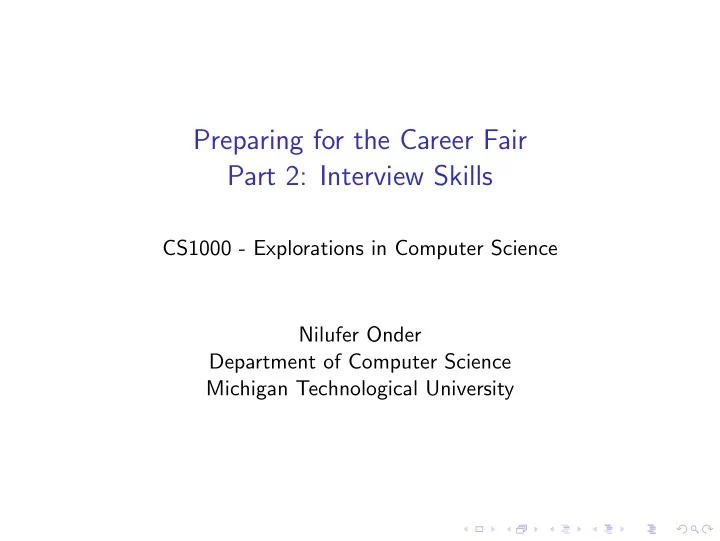

Preparing for the Career Fair Part 2: Interview Skills CS1000 - Explorations in Computer Science Nilufer Onder Department of Computer Science Michigan Technological University
Outline Overview Types of Interviews Before, during, and after the interview
Overview ◮ ”The interview gets you the job!” ◮ There are three crucial things you should to be successful (listed in no particular order): 1. Prepare 2. Prepare 3. Prepare ◮ How can you prepare? ◮ Know what to expect ◮ Know what recruiters expect ◮ Know what to do
Behavioral Interviews ◮ A conversational style interview where questions about professional, academic, and personal experiences are asked ◮ Example: Describe a time you had a conflict with a teammate on a project. What did you do? What was the outcome? ◮ Use the “STAR” method to cover every aspect the interviewer wants to know S ituation T ask A ction R esult ◮ See the example on page 31 of the Career Manual from the University of Michigan (http://career.engin.umich.edu/careermanual.pdf)
Technical Interviews ◮ Interviewers assess your technical skills through a demonstration of how you solve problems, reach conclusions and whether you incorporate novel thinking into your approach. ◮ Please explain the concept of polymorphism in object oriented development ◮ After the first year, the following core CS classes provide the essential knowledge Data Structures (CS 2321) Discrete Structures (CS 2311) and Formal Models (CS 3311) Concurrent Programming (CS 3331) Algorithms (CS 4321)
Before the interview ◮ Make sure you are ready from a technical perspective but don’t put a lot of emphasis on “studying” pay attention to your classes ◮ Assess your existing online identity ◮ Research the institution thoroughly ◮ Prepare questions to ask the interviewer ◮ Arrive 15 minutes early to relax and overcome anxiety
Communication during the interview ◮ Be savvy about speaking ◮ Speak clearly at a pace comfortable to understand not too fast, not with long pauses ◮ Avoid the use of filler words, e.g., “um”, “ah”, “like”,“you know”, “I think” ◮ keep your sense of humor but be very careful about cracking jokes ◮ Be savvy about nonverbal communication ◮ stand tall ◮ sit up straight ◮ use a firm handshake ◮ keep eye contact ◮ smile
After the interview ◮ If you don’t hear back at the specified time frame, follow up ◮ Deal with rejection effectively ◮ Don’t take it as a personal failure, you’ll fall into a loop of negative reinforcement ◮ Take it as a learning experience and find ways to improve ◮ When you get an offer ◮ Congratulations! ◮ Explore the pros and cons of accepting the offer salary, benefits, vacation time, other offers you might have
Sources for the slides (website last access: September 13, 2015) ◮ 2015 C2C (College to Career) Guidebook Career Services (www.mtu.edu/career/) Michigan Technological University, http://www.mtu.edu/career/students/guidebook.pdf ‘ ◮ 2015-2016 Career Manual, Engineering Career Resource Center (career.engin.umich.edu), University of Michigan, http://career.engin.umich.edu/careermanual.pdf.
Recommend
More recommend